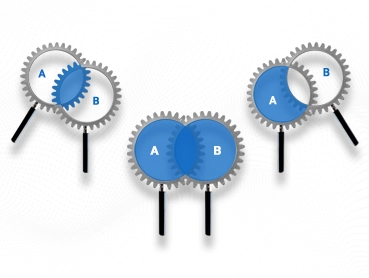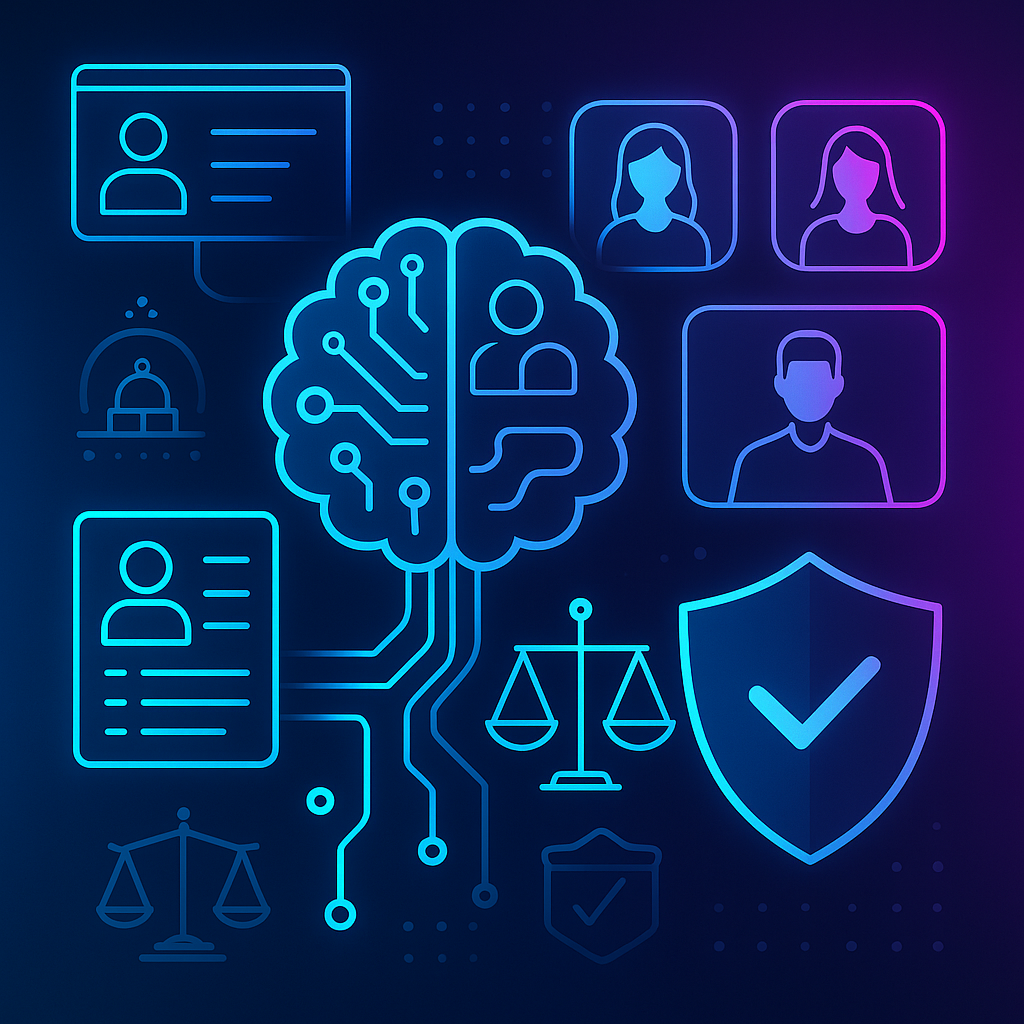Understanding Recruitment vs Talent Acquisition Differences

Let’s consider the question – Is talent acquisition and recruitment the same?
Though often used interchangeably, recruitment and talent acquisition play distinct yet complementary roles in workforce planning and the overall employee recruitment process. While recruitment focuses on attracting and sourcing qualified candidates, talent acquisition encompasses the broader hiring strategies needed to identify hiring needs, and recruit, onboard, and develop talent.
Having clarity on these nuances empowers organizations to shape strategic talent management plans, gain competitive advantage, and build teams that drive success.
This article takes you through the subtle differences between recruitment and talent acquisition and offers insights into leveraging these two pillars of strategic workforce planning for optimal returns.
Exploring Talent Acquisition
Talent acquisition is a forward-focused strategy centered on the long-term workforce needs of an organization. It encompasses strategic hiring, talent pipeline development, workforce forecasting, and long-term human resources planning to attract and engage high-potential talent aligned with an organization’s vision and objectives.
Talent acquisition professionals take the big-picture view while analyzing future skills gaps and building a robust talent pool via strategic initiatives to keep their organizations one step ahead. It’s not as simple as picking candidates right out of college anymore: up to 72% of businesses prioritize skills over certificates(1), making the role of talent acquisition even more crucial.
Demystifying Recruitment
In contrast to talent acquisition, recruitment is more tactical and centered on immediate staffing needs. Recruiters swiftly address vacancy fulfillment by leveraging tools like job postings, screenings, and interviews.
While talent acquisition focuses on the long game, recruitment focuses on short-term hiring solutions aimed at seamless day-to-day operations by quickly placing qualified candidates into open roles. The journey from a vacancy opening up to a new candidate joining the team is known as the recruitment cycle.
Is a talent acquisition specialist a recruiter? No, given our understanding of the distinctions discussed above! Each function has a unique value-add, and although they are different, talent acquisition and recruitment work hand-in-hand as integrated elements of a holistic hiring strategy.
Interested in an advanced AI-powered solution for filling vacancies on demand with high-quality, compatible talent? Explore Leoforce by Leoforce!
Difference Between Talent Acquisition and Recruitment
While talent acquisition and recruitment both aim to bring exceptional workers into an organization, recruitment differs significantly from talent acquisition in terms of strategies, fundamental hiring objectives, and outcomes.
Focus:
- Talent Acquisition: Broad and future-oriented, aimed at building a talent pool for anticipated needs.
- Recruitment: Narrow and present-oriented, addressing immediate vacancies.
Strategies:
- Talent Acquisition: Strategic initiatives like organizational needs assessment, employer branding, talent pool development, and targeted talent communities.
- Recruitment: Tactical techniques like job postings, targeted sourcing, screening assessments, and structured interviews.
Outcomes:
- Talent Acquisition: A loyal and engaged talent pipeline, enhanced employer brand, and long-term talent retention.
- Recruitment: Quick and efficient filling of positions with qualified candidates.
So, which approach should you choose? The answer lies in carefully assessing your organizational goals and resource availability. Since immediate vacancies are to be expected, you can’t ignore recruitment. But for building a future-proof workforce that propels your long-term success, you need a robust talent acquisition plan.
The Strategic Role of Talent Acquisition
Talent acquisition can be likened to a farmer nurturing his fields and tending to the needs of a robust pool of talent aligned with future organizational needs.
It starts with targeted talent engagement and outreach. Talent acquisition specialists participate in relevant events, nurture talent communities, and leverage creative employer branding to attract candidates who fit the culture of a business or organization.
Building an employer brand that resonates is extremely powerful in the context of talent acquisition. According to the Edelman trust barometer, 60% of respondents would choose a place to work based on their beliefs and values(2), essential components of your employer brand. Developing that calls for best practices like showcasing employee testimonials, career growth opportunities, and your inspiring vision.
Along the way, diversity and inclusion need to be nurtured through ongoing and effective talent pool diversification efforts. Achieving both short and long-term strategic talent management goals requires evaluating current talent, defining future needs, and formulating a comprehensive roadmap.
Proactive strategies to maintain continuous talent acquisition include:
- Monitoring industry trends to identify critical skills gaps.
- Adjusting strategies regularly to attract emerging talent with in-demand abilities.
- Measuring and tracking progress through data-driven talent analytics.
With a nimble and forward-looking approach, talent acquisition strategies can help cultivate an ever-growing pool of promising talent that is ready to harvest future successes.
Need an advanced solution for building a long-term talent pipeline based on AI-powered market intelligence?
Leoforce by Leoforce, has got you covered!
Recruitment Practices for Immediate Hiring Needs
Now, let’s shift focus to the world of recruitment. Effective recruitment techniques include:
- Targeted Job Postings: Crafting compelling job descriptions highlighting your company culture and values to attract the right talent pool. Utilize relevant keywords and platforms to maximize visibility.
- Structured Interviews: Implementing standardized interview processes with clearly defined evaluation criteria to ensure fairness and objectivity in candidate screening and selection.
- Skill-Based Assessments: Leveraging skill-based assessments to objectively evaluate candidate qualifications and identify the best fit for a role.
The Vital Role of HR
HR teams play a critical role in ensuring fair and efficient recruitment processes. They uphold legal and ethical standards, safeguard candidate confidentiality, implement best practices for a positive candidate experience, and undertake hiring process optimization.
Let’s delve deeper into transitioning from recruitment to talent acquisition, implementing impactful strategies, and the pivotal roles of recruiters and talent acquisition specialists!
Want a standalone recruiting solution for increased productivity? Leoforce Fusion is your answer!
Transitioning from Recruitment to Talent Acquisition
Now that we’re clear on the distinction between recruitment and talent acquisition, let’s focus on strategies that help businesses and organizations transition from the former to the latter.
The challenge here is making the shift from a purely reactive recruitment mindset to a proactive, strategic talent acquisition approach.
Align with Business Goals
First, define your overall business objectives clearly and identify future talent needs. This involves conducting thorough market research, analyzing industry trends, and forecasting your growth trajectory. Once you have a clear roadmap, you can build a talent acquisition approach that matches your long-term goals.
Integrate Talent Acquisition
Don’t think of talent acquisition as a separate entity. Embed its principles into your broader HR practices to foster a culture of proactive talent management. Encourage collaboration between various departments, empowering them to actively source and engage potential candidates who align with your future needs.
Integrating talent acquisition into your business processes will be far more effective in achieving your goals.
Leverage Technology
Embrace technology like AI as your strategic partner to optimize your talent acquisition goals. According to a report by Korn Ferry, 80% of CEOs and senior leaders intend to increase investment in AI-powered talent acquisition tools by 2024.
Explore practices such as using applicant tracking systems (ATS) to streamline recruitment processes, AI-powered candidate-sourcing tools to identify hidden talent pools, and social media platforms for employer branding and targeted outreach.
Remember, however, that technology is a tool and not a replacement for humans; so ensure responsible and ethical use throughout your talent acquisition and HR transformation journey.
Niche Talent Acquisition
Traditional recruitment methods might fall short for certain industries or highly specialized roles. Niche talent acquisition meaning lies in taking a dedicated approach to source and attract top talent within specific, often competitive domains.
This involves:
- Industry Expertise: Deep understanding of the specific talent pool, skills, and compensation benchmarks within the niche.
- Targeted Networking: Building strong relationships with industry experts, attending relevant conferences and events, and leveraging professional networks.
- Personalized Outreach: Crafting tailored messaging and communication strategies that resonate with niche talent. Highlighting unique opportunities and career growth potential within your organization.
While transitioning to talent acquisition is necessary for scaling workforce capabilities, it demands a gradual and methodical approach. Be patient, experiment with different strategies, and continuously evaluate your progress based on defined goals and metrics.
Need a powerful talent acquisition solution that goes beyond conventional AI recruiting, integrates with your current tech stack, and has a recruiter automation tool that decreases sourcing and shortlisting time by 50%? Check out Leoforce by Leoforce.
Implementing Talent Acquisition Strategies
As the 2023 Employ Recruiter Nation Report notes, it is “challenging for growing companies to attract qualified candidates if they have a lesser-known employer brand”(3). On the other hand, a compelling brand narrative can give you a significant edge in attracting top talent.
Often, therefore, the first milestone in the implementation of talent acquisition strategies involves effective employer branding across channels like social media and targeted ads.
Meanwhile, stay connected through ongoing candidate engagement. Share informative content, host virtual events, and participate in online communities to nurture relationships.
Possibly the best talent acquisition strategy in 2024 is streamlining efforts with AI-powered talent acquisition solutions. 59% of HR decision-makers already plan to invest more in AI this year(4).
Among such technologies, Leoforce’s Leoforce is a leading, next-generation recruitment solution that goes beyond conventional AI recruiting. It adopts a multidimensional approach to deliver qualified and compatible talent, regardless of business type, industry, hiring volume, or budget.
It integrates with your company’s current tech stack, streamlines and personalizes talent engagement, and instantly gives you access to 150 million active and 650 million passive job seekers.
The next stage of implementing talent acquisition involves applying structured onboarding solutions. Transition new hires seamlessly by setting clear expectations, offering mentorship, facilitating connections, and fostering a sense of belonging from day one.
Finally, don’t forget that recruitment still has a tactical role in filling immediate openings. Let AI handle high-volume tasks so you can focus on the rest. With the right strategies and tools in place, your talent acquisition efforts will yield a high-performing and engaged team that is ready to deliver.
Recruiter vs Talent Acquisition Specialist
What is the difference between a recruiter and a talent acquisition specialist?
While both work towards the common goal of hiring top talent, the approaches and areas of expertise for these specialist roles differ significantly.
Recruiter
- Focus: Filling current vacancies efficiently, leveraging recruitment tools and techniques.
- Skills: Candidate screening, interview skills, strong understanding of the current job market.
- Metrics: Time-to-hire, cost-per-hire, and filling open positions quickly.
Talent Acquisition Specialist
- Focus: Building a talent pipeline for future needs, crafting employer branding initiatives, and implementing strategic talent acquisition plans.
- Skills: Market research, data analysis, employer branding expertise, and strategic planning.
- Metrics: Quality of hire, talent pool diversity, and employer brand awareness.
The roles of a recruiter and talent acquisition specialist are not mutually exclusive. Depending on your organization’s size and needs, you might have dedicated teams or individuals performing either function.
The key is to understand the specific skills and expertise offered by a talent acquisition specialist vs a recruiter and align them with your organizational goals.
Best Practices and Tips
Several best practices can help optimize your approach to balancing recruitment vs talent acquisition:
- Maintain the tactical role of recruitment in swiftly filling vacancies while talent acquisition focuses on long-term strategy.
- Understand and leverage the distinct benefits of talent acquisition vs recruitment to get the best of both worlds.
- Follow recruitment efficiency tips like using AI technology to expedite screening and interviews for open roles.
- Enable data-driven talent strategy optimization by tracking metrics on time-to-hire, cost-per-hire, and quality of hire.
- Develop a strategic roadmap for talent acquisition that aligns with overarching business goals.
By playing to the strengths of both recruitment and acquisition, you can build an optimal workforce that drives immediate and long-term success.
The Future of Talent: A Tech-Driven Collaborative Landscape
In conclusion, let’s summarize the distinctions between recruitment and talent acquisition.
- While recruitment focuses on filling immediate openings, talent acquisition takes a more strategic, long-term approach to building talent pipelines.
- Recruitment centers on tactical tasks like job postings and interviews to swiftly fill vacancies. In contrast, talent acquisition encompasses broader initiatives like employer branding, organizational needs assessments, and targeted outreach to curate a diverse talent pool.
- Recruiters and talent acquisition specialists have distinct skills, goals, and metrics.
- Businesses must leverage the unique strengths of both, and depending on their size and needs, find ways to blend the roles.
- Companies can build an agile workforce for current and future needs by using data-driven optimization aligned with long-term goals.
The world of talent acquisition and recruitment is constantly evolving, fueled by technological advancements, shifting demographics, and the ever-changing needs of businesses and individuals. So, what will the future of hiring look like?
AI-powered talent platforms are bound to have a game-changing effect on recruitment and talent acquisition. Used in tandem with human abilities, AI can predict future skill gaps, identify hidden talent pools, offer immersive candidate experiences that transcend geographical boundaries, optimize strategic workforce planning, and form collaborative talent ecosystems between businesses to source specialized talent for mutually beneficial projects.
The future of talent acquisition promises to be hyper-personalized, data-driven, adaptable, globally focused, and human-centric. The lines between recruitment and talent acquisition might also blur in the future to evolve into a holistic approach that embraces both short-term and long-term talent needs.
The future of talent is not predetermined. It’s shaped by the choices you make today. Start your journey by assessing your business needs and choosing appropriate strategies.
Leverage the power of Leoforce, by Leoforce, to transform your recruitment and talent acquisition efforts. Our next-generation AI recruiting solution delivers high-quality compatible talent––regardless of business type, industry, hiring volume, or budget. We offer enterprise-grade solutions for businesses and staffing agencies, as well as on-demand solutions for seasonal hires.
With Leoforce, you can ensure that your organization remains competitive and thrives in the ever-changing talent landscape of tomorrow.





